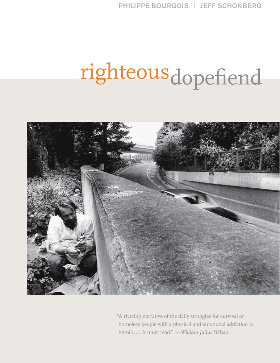“In Search of Respect. Selling Crack in El Barrio” is one of my favorite ethnographies. Now, Philippe Bourgois, is out with a new book. In “Righteous Dopefiend“, he looks at the clients of the dealers, the University paper Penn Current reports.
The paper published a interesting interview with him that also touches the popular topic “anthropology at home". Bourgois conducted his fieldwork among homeless heroin and crack users a mere six blocks away from his San Francisco home. He spent lots of time with them, and even slept outside in homeless encampments to gain a true sense of what life is like for the addicts.
What happened? People in the neighborhood began to think that the anthropologist must be one of the addicts as well:
During the intense years, when I’d be hanging out on the corner, people in the neighborhood just took for granted that I was either a drug addict or someone about to fall into drug addiction.
I remember being embarrassed in front of my son’s friends, because my son at this time was about seven years old when I started the project, and so all of his friends lived in the neighborhood and would say, ‘I saw your father hanging out on the corner where all the drug addicts are.’ I was worried about my son’s friends’ parents, because they were seeing me.
But although the addicts lived so close to the neighborhood, they were invisible. It was “mind-boggling", he says, that he literally had to walk not more than six meters through a little thicket in order to enter a totally separate universe:
You can hear all these people, I mean, literally, hundreds of people at rush hour, walking to the bus stop, and you’re in this separate universe, and the two don’t touch. You can spend several hours in this separate universe listening to people go by and they don’t look through the bushes and notice these people. You almost feel falsely protected in this cocoon.
People don’t want to see it, either, and the point of my book is to make it visible.
Bourgois connects the daily life in the thicket with larger structures in the society:
(W)hat is terrifying is seeing - and this is in a sense what the book is about - how structural forces beyond our control, historical forces, shifts in the economy, shifts in the political organization of public policy, come crashing down on vulnerable sectors of the population and basically shove them around in very unpleasant ways.
These are the people who weren’t able to recover from the downsizing of the industrial sector in the United States. A bunch of other types of industries arose in place of that, but those people who aren’t able to make that adjustment, those people who don’t have the education to shift from being a factory worker to being an information technology processor, are people who fall into indigent poverty.
The guys that we studied - their parents were the people who lost their jobs working on the docks of San Francisco, working in the steel mills, working in the warehouses that were serving the active factory sector of San Francisco as a port industrial city.
These are forces that are much larger than the will of any individual or the moral ability of any individual to act in a way that’s going to make them a productive member of society. The book is trying to show those dynamics and when you dig deeper you then see these other patterns, that whites are affected by this very differently than African Americans.
Over half of his informants have passed away during the study and in the two years since the end of the actual field work.
>> read the interview in the Penn Current
>> download the first chapter of the book
On his website, he has published lots of papers!
UPDATE Long article about the book in The Chronicle Review: An Anthropologist Bridges Two Worlds. See also the comment by Eugene Raikhel at Somatosphere
SEE ALSO:
The most compelling ethnographies
Is the anthropologist a spy? New Anthropology Matters about fieldwork identities
Study: Drug smuggling as vehicle for female empowerment?

Great news! “Selling crack in el barrio” is also one of my favurite ethnographies, It got awarded best course litterature one semester at Stockholm University where I study. I am really looking forward to reading this next one!